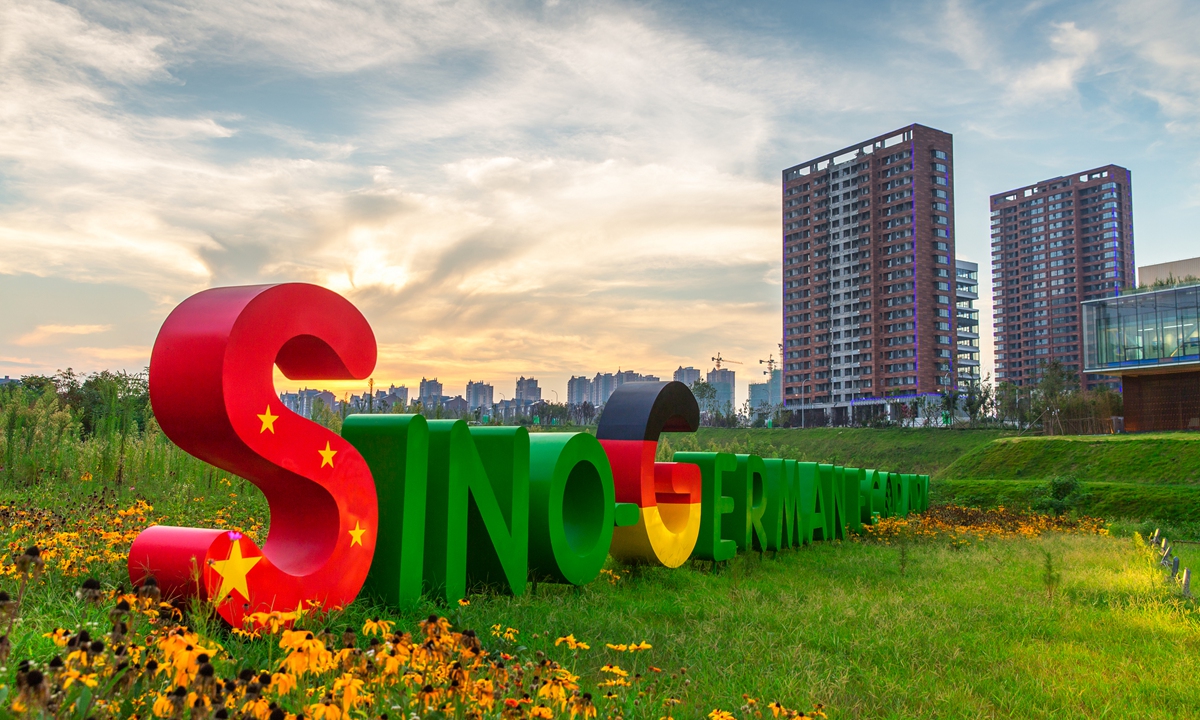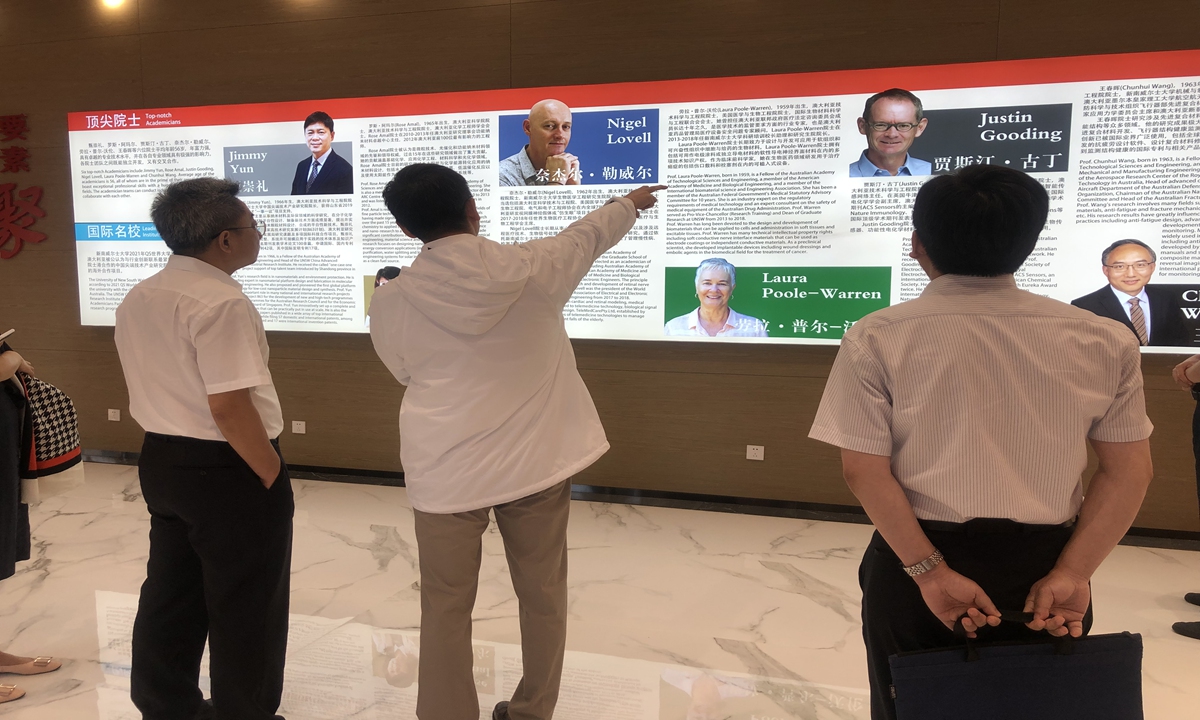Qingdao continues to attract top foreign talent, tech investment with favorable policies
By Leng Shumei in Qingdao Source: Global Times Published: 2020/10/15 20:08:40

A view of the Sino-German Ecopark Photo: Courtesy of the Sino-German Ecopark
As Qingdao, a coastal city in East China's Shandong Province, conducts citywide COVID-19 nucleic acid tests in the latest outbreak, foreigners living in the city are cooperating with and contributing to the campaign.More than 100,000 foreigners live in Qingdao, one of the top 10 most popular Chinese cities for foreigners. Many of them were attracted to the city for its favorable policies for international talent.
Tire Technology Alliance (TTA), a tire developer created by 79-year-old German Siegfried Ratzeburg in Qingdao, provided testing for all its employees, the company told the Global Times.
TTA is running as usual and completing protective measures under the guidance of local health authorities, said an employee surnamed Wang.
Ratzeburg created TTA 11 years ago after he moved to Qingdao, his wife's hometown. He is among many foreign residents who have taken Qingdao as a second home.
Kim Hyung-ho, a South Korean doctor specializing in acupuncture physiotherapy, said since Qingdao is very close to South Korea, local culture is similar too. "But most importantly, friendship and warmth I feel from local people and my colleagues are the reasons that make me stay here for so many years." Kim has studied and worked in China since 1992. He started to work at the International Clinic of Qingdao Municipal Hospital in 2013.

Jimmy Yun, a fellow of the Australian Academy of Technology and Engineering, introduces his research center at the Qingdao International Academician Port to visitors. Photo: Leng Shumei/GT
Academician portIn addition to its natural vistas, Qingdao also invests in new industries to attract more international experts and companies.
The city launched the Qingdao International Academician Port (QIAP) in 2016 aiming to provide a concentrated research and industry incubation base for global academicians and their teams specializing in bio-medicine, next-generation information technology, high-end equipment, and alternative energy and new materials.
The port covers nine core sections, including 201,000 square meters of academician workstations, 100,000 square meters of academician industry accelerators and 1.02 million square meters of academician research institutes.
A phase two construction is also underway and expected to be ready for use by the end of this year. It will provide 18 academician research and development building complexes that can accommodate 30 academicians.
Jimmy Yun, a fellow of the Australian Academy of Technology and Engineering and head of UNSW China Advanced Technology Industrial Research Institute, is one of the academicians who have settled in the port since 2019.
Yun is a professor in the field of energy nanomaterials and functional nanomaterials. He said he decided to settle in Qingdao because of the city's complete production chain for his new research in hydrogen energy source.
More academicians would have already settled in the QIAP but the plan was affected due to the COVID-19 pandemic.
In response, the local government has carried out measures such as "no-face approval" for foreigner work permits to make the procedure as fast as within five days. Yun also works online with his partners and students in Australia to reduce the impact of the pandemic.
Aside from Yun, 108 domestic and international academicians have so far signed up with the QIAP, such as Yuan Longping, the "father of hybrid rice," and Ma Weiming, an authority of electromagnetic launch. They have launched 18 projects and developed 117 products.
In 2018, the yearly output value of the QIAP exceeded 10 billion yuan and the tax revenue exceeded 1 billion yuan.
Cooperative ecopark
In 2017, Qingdao-based home appliances giant Haier established the COSMOPlat procurement platform in the Qingdao Sino-German Ecopark.
With integration of the world's first-class resources, the platform is committed to taking the lead in professional procurement services in the Internet of Things era, providing intensive procurement, model transformation, big data and other services to establish an ecosystem for innovation.
So far, the platform has launched projects in 25 industrial parks and 122 production centers around the world.
The platform also plays a vital role for Chinese manufactures to transfer and recover rapidly during the COVID-19 pandemic.
On February 7, the first automatic mask production line in North China's Shanxi Province was put into use in the Houma economic development area, just 48 hours after the local government launched an urgent mask production project on the COSMOPlat through which they quickly attained materials and facilities.
The platform has connected more than 20,000 small and medium-sized enterprises and helped at least 2,100 companies to quickly recover or expand production after the epidemic.
A gene research institute of Chinese genomics giant Beijing Genomics Institute (BGI) Group is also located in the Sino-German Ecopark and has contributed greatly to China's fight against COVID-19. From April 10 to September 27, a BGI Huo-Yan Lab in the park had tested 75,000 nucleic acid samples. The Huo-Yan Lab is also helping in the citywide testing in Qingdao's latest outbreak. The company announced on Wednesday they have upgraded the lab which could test 400,000 samples a day.
A research team led by Lars Bolund, a professor from the Aarhus University Denmark and Director of BGI Lars Bolund Institute of Regenerative Medicine, is conducting research on how the COVID-19 damages patients' blood vessels and causes severe diseases.
"I am impressed by the speed of BGI to apply basic research into the combat against the epidemic and the world should be impressed by how China handles the issue while it is much worse in Europe and the US," Bolund said.
Bolund is one of the 450 foreign experts who have settled down in the Sino-German Ecopark. Covering an area of 202 square kilometers, the park is now home to more than 1,200 global companies, including six Fortune Global 500 companies like Siemens.
"I did not expect the park to develop so fast when I first visited here in 2013 when the construction of the park just started," said Peter Tichauer, media executive for the Sino-German Ecopark.
Now the park has developed into a model of green city and future city for the world, Tichauer said.
Newspaper headline: Coast of collaboration
Posted in: IN-DEPTH